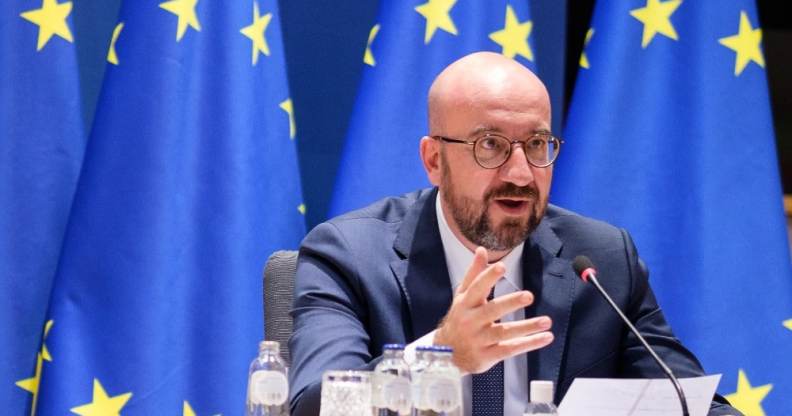European Council president sends crystal clear message to Georgia: Respect LGBT+ rights

President of the European Council, Charles Michel, in a video conference meeting with the Georgian president on April 19, 2021 (Thierry Monasse/Getty)
The president of the European Council has travelled to Georgia following the horrific outbreak of anti-LGBT+ violence at Tbilisi Pride.
President Charles Michel arrived in Georgia on Tuesday (19 July), notably meeting with leaders of the opposition parties before he saw the prime minister, Civil.ge reports.
Although the visit was ostensibly to discuss the implementation of the 19 April Agreement, an EU-brokered deal to end the country’s political deadlock, Michel took the opportunity to raise the terrifying far-right violence that seized the city on 5 July.
Speaking after the meeting, United National Movement MP Khatia Dekanoidze said the opposition had informed Michel that the far-right protests proved “the Georgian government openly relies on violent groups and comes into conflict with our European partners”.
The attacks on 53 journalists and the subsequent death of TV Pirveli cameraman Aleksander Lashkarava were also discussed, she added.
Her fellow MP Salome Samadashvili said Michel heard how the developments of the past few weeks “are not only a significant step back from our European agenda, but also threaten its realisation.”
This will have been an uncomfortable topic for the Georgian government, who have been widely blamed for stoking the far-right violence ahead of Tbilisi Pride.
They have also been accused of a “cover up” in the death of Lashkarava after suggesting he may have died of a heroin overdose and not the violent mob attack he was subjected to days before.
Michel’s decision to speak with the opposition before the prime minister sent “a significant message to the government,” Dekanoidze noted.
Among the others he chose to meet before the prime minister were Badri Japaridze of the Lelo–Partnership for Georgia faction, Giorgi Vashadze of Strategy Aghmashenebeli, Khatuna Samnidze of Republican Party, Levan Ioseliani of Citizens, Vakhtang Megrelishvili of right-libertarian Girchi party, Natia Mezvrishvili of For Georgia, and Pridon Injia of European Socialists.
European Council warns Georgia: LGBT+ rights ‘not a marginal issue’
In a statement on Tuesday, the president said that his “single most important message to all political parties” concerned the implementation of the 19 April Agreement, which remains the best guarantee to advance Georgia’s democratic agenda.
However, he refused to ignore the surge in homophobic violence and drew attention to this in his remarks.
“I also stressed in all my meetings today the central role fundamental rights and freedoms play in our EU-Georgia relations. Rights of minorities are not a marginal issue – respect for diversity and human dignity are essential to our fundamental values,” he said.
“The constitutional rights to freedoms of expression, press and assembly must be upheld.”
Returning to the matter of the diplomatic agreement, he pointedly called on Georgia to develop “a more inclusive, united way forward among all political forces in the country”.

